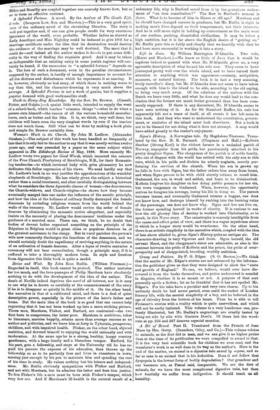Sign's History. A Norwegian tale. By Magdalene Thoresen. Trans- lated
by the Rev. M. R. Barnard. (Chapman and liall.)—Kolbein Starker (Strong Karl) is the richest farmer in a secluded parish of Norway, unpopular from his pride, but passionately attached to his pretty daughter Sig,ne. The clergyman of the parish is of noble family, who out of disgust with the world has retired with his only-son-to this cure, which in his pride and disdain he utterly neglects, merely per- forming the services of the -church. When his son is grown up he falls in love with Signe, but the father orders him away from home, and when Signe proves to be with child sternly refuses to resell him. Gudmund, the son, is weak and selfish, and fears to be disinherited. Kolbein forgives his daughter on her doing public penance for her sin, but vows vengeance on Gudmund. When, however, the opportunity arrives he foregoes his revenge, losing his life in doing so. The parson becomes insane, and eventually Gudmund returns a beggar, one does not know how, and destroys himself by rushing into the burning ruins of the parsonage, one does not know why. Signe and her son live on, the former spending herself in works of charity. It is curious to see how the old gloomy idea of destiny is worked into Christianity, so to speak, in this Norse story. The catastrophe is scarcely intelligible from the cause-and-effect point of view, and there is a vague mysticism about it which in a longer story would be wearisome. On the other hand, there is an artistic simplicity in the narrative which, coupled with the idea of fate above alluded to, gives Sign's History quite an antique air. The character-drawing is very vigorous and fresh. Signe herself, the old servant Masai, and the clergyman's sister are admirable, as also is the contrast between the pride of Kolbein and the priest, the pride of over- prosperity and of disappointed, brooding, worldly ambition.


































 Previous page
Previous page